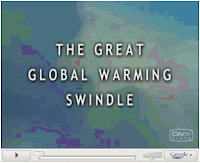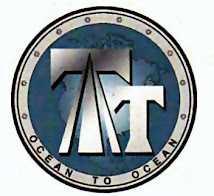Last Thursday, after President Bush's announcement on climate change I lamented, "Apparently there a no politicians remaining who are able to withstand the political pressure of the climate change alarmists." I was happy when I read this post today at small dead animals, because it appears that my initial take on the Bush announcement was dead wrong.
Has President Bush outfoxed and out-maneuvered both the Europeans and the UN on climate change policy? Planet Gore's Steven Hayward:
It seems to me that lots of people are missing a notable feature of Bush's proposal to convene a "Big 15" to contemplate long-range greenhouse gas emissions targets: Bush is in effect threatening to put the UN's IPCC out of business as the main diplomatic forum for global climate policy. Whatever else may be said—both good and bad—about Bush's initiative, putting the UN out of the climate business can't entirely be a bad thing.
I think it would be
entirely a good thing! Chris Horner has more analysis at
Planet Gore:
Non-alarmist, “global governance”-type followers of the Kyoto process have to love this. President Bush stunned the Europeans with his Thursday announcement, playing their game as well as they do but from a better position: US carbon dioxide emissions from 2000-2006 are flat. Europe’s are up and steadily rising, 6 years out of the 9* since Kyoto was agreed, in fact; US CO2 emissions over that same period are equally superior. The truth which the Administration refuses to say (more than once) is that big-talking Europe is a bossy non-performer. Bush diplomatically doesn’t say so, but instead preempted a planned political trap at the G-8 talks by clearly delineating the US position, incompatible with and pulling the rug out from under G-8 president Germany’s plan. German and G-8 president Angela Merkel planned to draw the US to an event to have pies thrown at them, then strong-arm them into agreeing to something the US otherwise rejected. That is, to replicate what happened at the Earth Summit in Rio in 1992.
At first this was trumpeted with a chorus of media “aha, at last, and it’s about time!”, indicating that they have not broken their practice of refusing reading the text of anything in this context, beginning with the Rio and Kyoto treaties down to the EU’s actual reports instead of press releases. In emails, some peers of mine despaired over the announcement. Green fury was more indicative of the substance, however, as Bush actually announced nothing not previously floated, and he did not commit the US to anything damaging. In addition to no damage on the policy front (Note: I limit my praise to the climate front; it still advances the horrible renewable fuel boondoggles), this was very good politics.
The 2050 horizon is grounded in more than a desire to replicate Gov. Schwarzenegger’s “I won’t be around by then” delegation. Nor is it simply seizing on observations of recent years, the opining of numerous solar physicists and the odds militating toward the possibility that by well before then we will have entered a cooling phase shutting the alarmists down, uh, “cold”. No, one of Kyoto’s biggest downsides is its absurdly short-term focus for fairly draconian reductions (bigger downsides still being that these cuts would according to no one have a detectable climate impact under any scenario or set of assumptions in the face of a crisis they cannot establish).
That’s benefit number two, on top of preempting a G-8 circus (inside, not outside where the barbarism celebrated by our intellectual elites continues its sorry resumption, in a country well versed in such a phenomenon). Better, Bush reiterated his “do your own thing” policy that China and other significant players have made unavoidably clear is a non-negotiable condition precedent. Immediately garnering the support of world leaders such as Japan’s Abe and the departing-but-Kyotophilic Tony Blair is priceless.
In short, with an offering far more credible on the global stage than Kyoto, Bush changed the news story and split European and relevant global opinion — I’m not concerned about whether the latter was his intent as churlish Europeans pout; they are responsible for their own feelings and actions and complaining about this result is infantile and substance-free.
He also did this without changing policy. Who knows, maybe the White House now “gets it” so much that, if our EU friends keep pushing it, we will hear about actual emissions performance since Kyoto was agreed.
As if on cue, the WWF released a
climate scorecard:
An international environmental organization has ranked Canada and the U.S. last among the G8 nations when it comes to tackling climate change.
Amazing how they can place the U.S in last place when, as Horner states above, the U.S. carbon dioxide emissions from 2000-2006 are flat while Europe’s are up and steadily rising. I guess it's not emissions that matter, it's whether or not you sign on to the Euro-UN game plan.
In other news, Prime Minister Harper will tell the G8 that
Canada will not meet its Kyoto targets. China has unveiled its first national plan for climate change,
saying it is intent on tackling the problem but not at the expense of economic development.




 Watch the Great Global Warming Swindle
Watch the Great Global Warming Swindle










